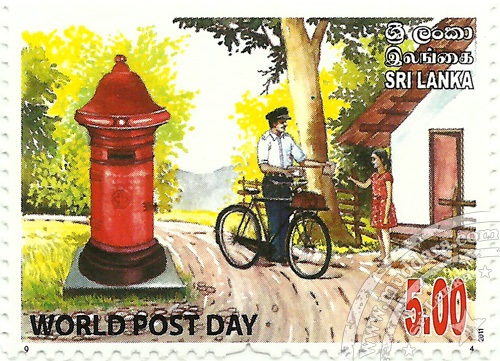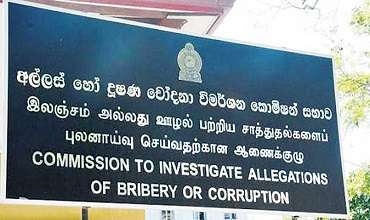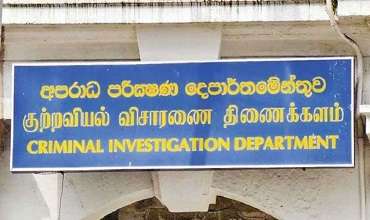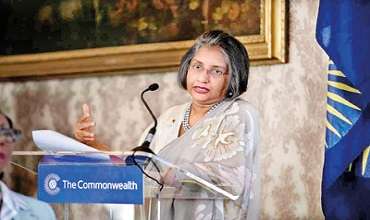Remembering World Post Day
The "WORLD POST DAY" was declared at the 16th conference of the Universal Postal Union (UPU) held in 1969 in Tokyo, Japan. The delegates voted to declare October 9 each year as “World Post Day” to mark the creation of the Universal Postal Union in 1874. It is observed on 09th October, recalling the signing of the Treaty of Bern on this day.
In 1863, a conference of representatives from 15 European and American countries was held and they laid down general principles for mutual agreement on international postal services, but did not create an international postal agreement. It was at the conference in Bern, Switzerland in 1874, the delegates from 22 countries reached agreement and signed the Treaty of Berne on October 9, 1874 and established General Postal Union. The General Postal Union membership grew rapidly and the union's name was changed to the Universal Postal Union in 1878. The UPU is the postal sector's primary forum for global cooperation. The UPU membership now stands at 192.

By early 18th centuries many countries entered into bilateral agreements for exchange of mail between countries. By late 1800 the large web of bilateral agreements made the distribution of international mail complicated, non-transparent and inefficient. The 1874 Treaty succeeded in unifying the confusing international postal services and regulations and bringing them into a single Postal territory for the exchange of mail between countries, pulling down barriers and frontiers and allowing free flow of international mail crossing boundaries of all nations and territories. The lasting accomplishment of the single Postal territory and the freedom of transit for Postal items came with it.
The postage stamp prepayment system was introduction in 1840 in England. Other countries started using the system in their Postal services. The UPU Treaty provided for mail items with stamps of member countries to be accepted for the entire international route transiting many countries and territories from the country of posting to the country of destination, enabling the distribution of international mail less complicated and more efficient.
On this day the Postal services around the world organize awareness programmes of the Post’s role in everyday lives of people and businesses, and its contribution to national, social and economic development. Member countries undertake programmes aimed at generating a broader awareness of their Post’s role. The postal services Issue commemorative stamps, lounge new postal services and other promotional activities commemorating this day.
Sri Lanka Postal Department organizes each year a Letter Writing competition among school children to mark this event. Selection of the best Post Office countrywide and the best Postal employee in different grades to encourage the employees; and national events promoting the Postal Services are among other activities it organizes.
This is also an occasion to bring awareness of the important role of the UPU and its relevance in today’s world of new technologies. The UPU established 144 years ago is one of the first examples of globalization. Today the world Postal network makes up the largest distribution network on the planet, enabling billions of people and businesses to communicate and exchange documents and goods. With widespread geographic reach and more than 660,000 post offices throughout the world, the postal network is the biggest network of physical, financial and electronic services, in the world. Post offices are everywhere, from the capital cities of industrialized countries to small rural towns of least developed countries. Thus, the Postal services have played an incredible role in shaping globalization.
New technologies are changing the postal world. The UPU is developing a range of technological applications and software solutions for mail management, Postal Financial services and support services benefitting the Postal sector and enabling it to reposition and maintain its relevance as an essential component of the global economy. The UPU Initiated programmes assists Postal services in member countries to adopt new technology strengthening their network and ICT capability enabling them to offer e-services.
The Sri Lanka Post as a partner of this worldwide network commands a very favourable position in our country. It has a network of nearly 5000 POs/SPOs across the country, reaching out to the remotest villages. The 550 main Post Offices are inter-connected in a computer network. It maintains universal home delivery of postal items employing nearly 8000 Postmen and altogether 26,000 employees. The Sri Lanka Post needs to strengthen its position as the local partner in this global network to offer e-services and make them efficient to be attractive to customer.
People send and receive mail and parcels. They can also get access to more sophisticated services such as account-based financial services and new IT-based services. When one buys a product from an e-commerce site, the order is placed and the price is paid on the internet. But in the end, the goods are not delivered electronically. A logistical partner, very often the Post, is the physical link between the seller and the buyer.
The Mail Business is the Sri Lanka Post’s major Revenue earner contributing Rs. 6,050 million (86%) of the SLP’s total revenue of Rs. 6,996 million in 2017. It’s only by developing and modernizing the Mail service the SLP can introduce innovative e-services. The modern technologies have entered the people’s lives. People want Postal services to be available in the same way as the services in the private sector they use in other activities of their lives. They need services accessed and delivered electronically. The Sri Lanka Postal must keep up to it.
The Postal department, having inter-connected the 550 main Post offices under the Post Office Networking project at a cost of Rs.650 million, is now in a very favourable position to introduce many e-services. The UPU has developed a range of technological applications and software solutions for mail management and the UPU assists member countries to introduce new e-Services. Using them a multitude of Electronic Mail Services could be introduced, and made available at the click of a button.
- E-Postal registered electronic mail;
- E-cards, the ability to buy a postcard online, which is then delivered to recipients by physical means;
- E-invoicing, a service supporting the delivery of electronic invoices;
- Online direct mail of advertising and/or other promotional communications by Post via electronic means;
- Hybrid mail, the sender posts original message in electronic form, which is then electronically processed and converted into a physical message for delivery to the addressee by the Postman as a normal letter;
- Post's website, one-stop-shop services, designing, preparation, printing and sending to their direct mail customers;
- Online facilitation to Post's website access to small mailers and sending of their direct mail campaigners ;
- Transactional mailings such as "transactional printing" offered to large enterprises. And many more.
However, it’s imperative to make Mail service efficient and, at the same time to reduce its operational cost. Modern technology is a means to dramatically improve services as well as reduce cost. Mail service’s efficiency and service quality are two essential attributes to attract customers.
To achieve this, it’s important the Postal department introduces a proper Postcode system enabling Mail Operations efficient and reliable. The Postcode speeds up the whole process of mail operation, increases efficiency and reduces operational cost. The UPU assists and encourages member countries to update existing Postcodes and to introduce Postcode in Postal services where the Postcode is not used. According to Universal Postal Union (UPU) records, by 2016 over 75%; 143 of its 192 member countries were using the Postcode in mail sorting. It shows its importance.
The Postal department could replace the present “Place Identifier” code it uses to identify POs and SPOs since 1997. The “Place Identifier” is a tool containing information capable of identifying places. It doesn’t contain information needed for Sorting and Routeing of Mail items. Instead, the Postcode contains information needed for sorting and routing of letters, parcels and other mail items. The Postcode identifies the Delivery Office, the Mail Route and transiting points, leading to the Office of Delivery of the letter. The Postcode connects all Mail Delivery Offices by the network of Mail Routes and Transit Offices. It speeds up Sorting and Routing process immensely and thereby reduces cost. The Postcode reduces the number of 5 to 7 times a letter is sorted at present to number of 2 to 3 times, reducing the transiting time of a letter from four days to two days, increasing overall Service Quality.
RAJA WICKRAMASINGHE
-
Still No Comments Posted.














Leave Comments